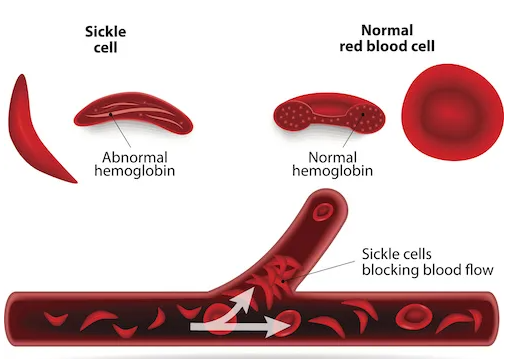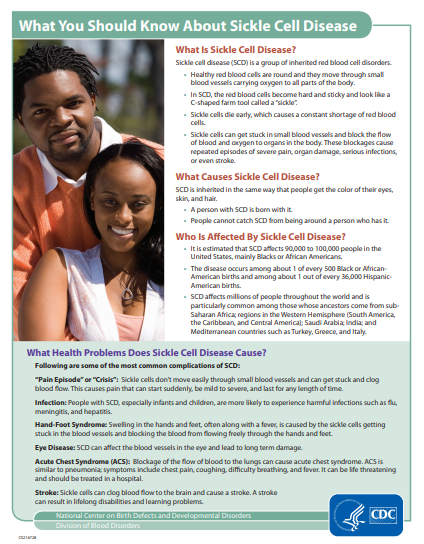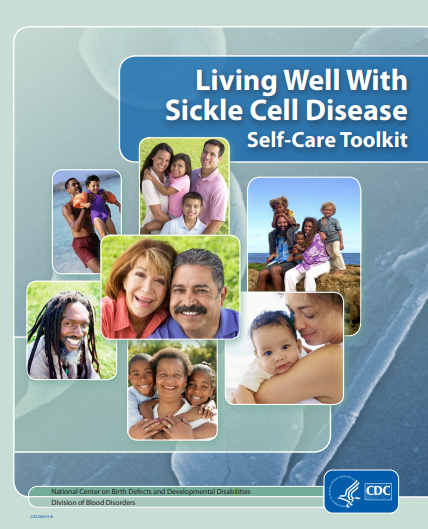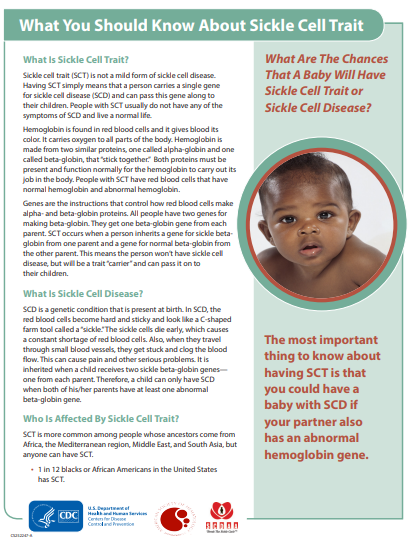Sickle cell disease is an inherited blood condition that affects red blood cells. The red blood cells change shape from round to sickle (crescent) shaped. This causes the cells to become stiff and block up the blood vessels in your body, causing pain and damage. They also get destroyed quickly, which causes anaemia and other serious complications.
We're aware of a problem when trying to use Zero Data to link to Healthify. Zero Data is managed by Health NZ and we are working with them to get this fixed.
Sickle cell disease
Key points about sickle cell disease
- Sickle cell disease is an inherited and life long condition.
- The disease affects red blood cells.
- It affects millions of people around the world.
- It can cause serious complications such as sickle cell crises and anaemia.
- With the right support, treatment and care a person with sickle cell disease can live a long and high quality life.

In your red blood cells there is haemoglobin. This is the part of the red blood cells that carry oxygen around your body. One small change in the gene of people with sickle cell disease makes the haemoglobin change shape from round to a rod like shape. This causes the red blood cell to change shape from a normal round donut shape to a sickle (crescent) shape. It also becomes sticky. The change in shape and it's stickiness makes the cell more likely to block blood flow.

Image credit: UTSouthwestern Medical Centre, US
It is inherited which means that it is passed down from parent to child. You are born with it, you can't catch it.
If you have one particular gene from each parent, you will have sickle cell disease. If you have the gene from one parent, you will be a carrier of the condition. It's also known as having the sickle cell trait. Carriers do not usually have any symptoms, but can pass it on to their child if the other parent also passes on the gene.
Sickle cell disease is the most common inherited condition in the world and mostly affects people whose family origins are in the Middle East, Sub-Saharan Africa, parts of India and parts of the Mediterranean. It affects millions of people around the world.
Sickle cell disease causes a number of health problems. These include painful episodes (sickle cell crises), sickle cell anaemia and getting infections often.
Sickle cell anaemia
Nearly all people with sickle cell disease have sickle cell anaemia because there is less oxygen in your body. Read more information about sickle cell anaemia.
Sickle cell crises
When sickle cells block your blood flow, they can cause symptoms of a crisis. How often you have a crisis varies for each person. Symptoms can be very distressing and can include severe pain, tiredness, jaundice (yellowing of the white of the eyes), pale skin, dizziness, headaches and fever.
| Seek urgent medical help if you have any of the following serious symptoms: |
It's important to seek help to avoid more serious problems. |
Symptoms can come on suddenly and they can start at any age. They can last a few hours or may last for several days. It's not always clear what triggers or starts off a crisis, but sometimes it can be caused by the weather (eg, wind, rain or cold), dehydration, stress or strenuous exercise. Often there is no specific trigger.
Other complications of having sickle cell disease include:
- Being more likely to have infections.
- Delayed growth during childhood and delayed puberty.
- Gallstones, which can cause tummy (abdominal) pain, yellow skin and eyes (jaundice), and bone and joint pain.
- A persistent and painful erection of the penis (priapism), which can sometimes last several hours.
- Painful open sores on the lower legs (leg ulcers).
- Strokes or transient ischaemic attacks, where the flow of blood to the brain is blocked or interrupted.
- A serious lung condition called acute chest syndrome, which can cause a fever, cough, chest pain and breathing difficulties.
- Swelling of the spleen, which can cause shortness of breath, a rapid heartbeat, tummy pain, a swollen tummy and anaemia.
- Eyesight problems, such as floaters, blurred or patchy vision, reduced night vision and occasionally sudden vision loss.
- High blood pressure in the blood vessels that carry blood from the heart to the lungs (pulmonary hypertension).
- Kidney or urinary problems, including blood in the urine and bedwetting.
A blood test is used to diagnose sickle cell disease. New born babies can also be tested for sickle cell disease in the first week of life.
Although there is no cure, there are treatments to help you manage the disease and live a long life. Treatment is aimed at improving the quality of your life, managing complications and preventing them from happening as much as possible. This can include self-care measures (see below) and medicine.
Medicine and treatment includes:
- pain relief, such as paracetamol or ibuprofen (sometimes treatment with stronger painkillers in hospital may be necessary). Do not give aspirin to children under 16.
- hydroxycarbamide (hydroxyurea) to reduce symptoms.
- blood transfusions for severe anaemia.
Apps reviewed by Healthify
You may find it useful to look at some Self-management and healthy living apps and Nutrition, exercise and weight management apps.
Make an appointment with your doctor at least once a year to see how your condition is doing. As part of your check-up your doctor may want to have some tests done, such as:
- A detailed scan of your heart (echocardiogram).
- Blood pressure, urine and blood tests.
- A special eye test (retinal screening) to detect any problems at the back of your eyes.
Sickle cell disease can't be cured but with the right support and self-care measures, you can live a normal and healthy life.
Avoid infections
You are at extra risk of infections with sickle cell disease, so it is important to be up to date with all of your vaccinations, to practice good hand cleaning hygiene and good food hygiene. If you're travelling to an area where malaria is found, it's important to take antimalarial medication as well as extra food and water precautions.
Avoid situations can can trigger a crisis
There isn't always a way to prevent a sickle cell crisis, but you can try to avoid triggers such as cold, dehydration and tiredness.
Quit smoking and avoid street drugs
Smoking and using street drugs can increase your risk of developing serious complications such as acute chest syndrome.
Seek help and support
You are not alone. It is important to seek help and support for your condition. Register with a GP and see them at least once a year. If you are missing school or work due to sickness see your GP for support.
Know how to manage the pain of a crisis at home
Try to recognise the early signs that a crisis is starting. Take painkillers, rest, keep hydrated (drink plenty of water) and keep warm. Apply a heat pad to the area. Distract yourself with music, puzzles or movies. If the pain becomes worse or you feel generally unwell get help. Do not delay contacting a doctor or nurse when you need help with managing your symptoms.
Stay hydrated
Some patients find the more hydrated they are the less likely they are to have a crisis. Increase oral fluid intake to about 3 litres of water per day for adults on hot days. Avoid excessive fluid loss and severe heat. Avoid tea, coffee and alcohol as it can make you dehydrated.
Exercise
Exercise is great for the mind and to stay fit. Avoid intense activities that cause you to become seriously out of breath.
Having a baby
If you are planning to have a baby, get in touch with your healthcare provider. They can give you advice on how to achieve the best possible health for yourself and your baby. There are tests you can have when you are pregnant to find out whether your baby has sickle cell disease.
Support
Sickle Cell Society(external link) UK
Leukaemia & Blood Cancer NZ(external link) or 0800 15 10 14
Muskaan Care Trust website(external link), Facebook page(external link), closed support group(external link)
The following links provide further information about sickle cell disease. Be aware that websites from other countries may have information that differs from Aotearoa New Zealand recommendations.
Sickle cell disease and pregnancy(external link) Royal College of Obstetricians & Gynaecologists, UK
Dehji's story(external link) Leukaemia & blood cancer NZ
Factsheets on sickle cell disease(external link) CDC, US
Sickle cell disease(external link) NHS, UK
Real stories from people with sickle cell disease(external link) CDC, US
Sickle cell disease leaflets in Arabic, Chinese (simplified), Chinese (traditional), Greek, Italian, Sihalese, Sudanese Arabic, Tamil, Vietnamese(external link) Thalassaemia and Sickle Cell Australia (TASCA)
Apps
Self-management and healthy living apps
Nutrition, exercise and weight management apps
Resources
What you should know about sickle cell disease fact sheet(external link) CDC, US
Toolkit for living well with sickle cell disease(external link) CDC, US
Sickle cell trait fact sheet(external link) CDC, US
References
- Sickle cell disease and Sickle cell anaemia(external link) PatientInfo, UK, 2017
- Sickle cell disease(external link) John Hopkins Medicine, US
- What is sickle cell disease(external link) News British Society for Haematology, UK, 2018
- About sickle cell disease(external link) Imperial College Healthcare NHS, UK, 2019
- Sickle cell disease(external link) NIH, US, 2020
Sickle cell guidelines(external link) British Society for Haematology, UK
Standards for the clinical care of adults with sickle cell disease in the UK(external link) Sickle Cell Society, UK, 2018
Hemoglobinopathies current practices for screening, confirmation and follow-up(external link) CDC, US, 2015
Sickle cell disease and sickle cell anaemia(external link) PatientInfo, UK, 2017
What is sickle cell disease(external link) British Society for Haematology, UK, 2018
About sickle cell disease(external link) Imperial College Healthcare, NHS, UK, 2019
Sickle cell disease (external link) NIH, US, 2020
Sickle cell disease for health professionals(external link) NIH, US, 2024
Apps
Self-management and healthy living apps
Nutrition, exercise and weight management apps
Brochures
Credits: Healthify editorial team. Healthify is brought to you by Health Navigator Charitable Trust.
Page last updated:








